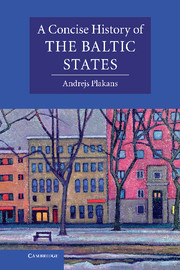Book contents
- Frontmatter
- Contents
- List of plates
- List of maps
- Preface
- 1 The peoples of the eastern Baltic littoral
- 2 The new order, 1200–1500
- 3 The new order reconfigured, 1500–1710
- 4 Installing hegemony: the littoral and tsarist Russia, 1710–1800
- 5 Reforming and controlling the Baltic littoral, 1800–1855
- 6 Five decades of transformations, 1855–1905
- 7 Statehood in troubled times, 1905–1940
- 8 The return of empires, 1940–1991
- 9 Reentering Europe, 1991–
- Suggested readings
- Index
- CAMBRIDGE CONCISE HISTORIES
7 - Statehood in troubled times, 1905–1940
Published online by Cambridge University Press: 05 June 2014
- Frontmatter
- Contents
- List of plates
- List of maps
- Preface
- 1 The peoples of the eastern Baltic littoral
- 2 The new order, 1200–1500
- 3 The new order reconfigured, 1500–1710
- 4 Installing hegemony: the littoral and tsarist Russia, 1710–1800
- 5 Reforming and controlling the Baltic littoral, 1800–1855
- 6 Five decades of transformations, 1855–1905
- 7 Statehood in troubled times, 1905–1940
- 8 The return of empires, 1940–1991
- 9 Reentering Europe, 1991–
- Suggested readings
- Index
- CAMBRIDGE CONCISE HISTORIES
Summary
The eastern Baltic littoral entered the twentieth century quietly, but in 1901 the city of Riga marked the seven hundredth anniversary of its founding with very elaborate celebrations. The multifaceted history of the city, in some sense representing the whole littoral, was symbolized by the existence in Riga of statues dedicated to Bishop Albert, the founder; Peter the Great, the tsar of Russia who brought Livland into the empire; and Johann Gottfried Herder, the philosopher, who had insisted that the Volksgeist (spirit of the people) was a supremely important element in human affairs. Also in 1901 the Riga City Council elected as mayor George Armistead, a wealthy merchant with progressive ideas and the scion of a germanized English family that had resided in Riga since 1812 and had become part of its dominant German-speaking patriciate. Since by 1897 the city's population had become mostly Latvian (41.6 percent), with Germans (25.5 percent) and Russians (16.9 percent) comprising most of the rest, it was therefore not clear, in Herderian terms, which of the Volksgeister was representative. Armistead's tenure until 1912 was a period of uninterrupted economic growth and urban modernization; at the same time, he and his social class treated the events during the revolutionary years 1905–1906 as unwelcome interruptions to progress and not as the signals of deep-seated socioeconomic and national divisions in the littoral that they undoubtedly were.
- Type
- Chapter
- Information
- A Concise History of the Baltic States , pp. 266 - 335Publisher: Cambridge University PressPrint publication year: 2011



